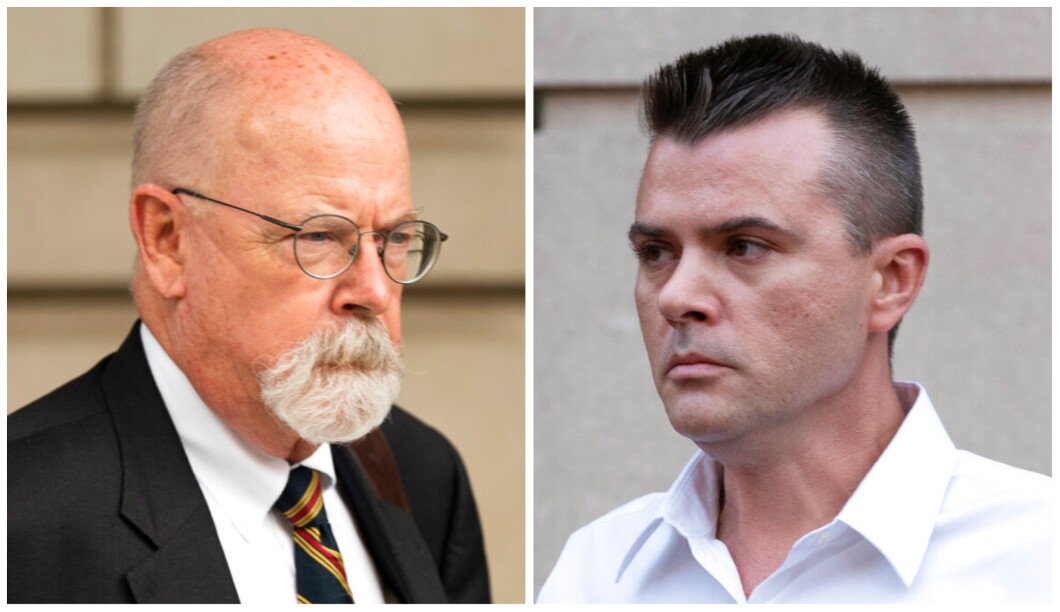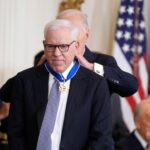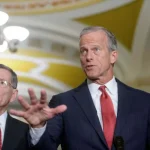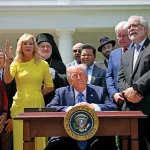
ALEXANDRIA, Virginia —The FBI’s internal investigation unit sought to discipline and suspend the FBI analyst who interviewed Igor Danchenko in January 2017 and who was special counsel John Durham’s first witness this week in the false statements trial against the main source for British ex-spy Christopher Steele’s discredited anti-Trump dossier, new court testimony revealed.
FBI supervisory intelligence analyst Brian Auten, who disclosed Wednesday that Durham informed him in 2021 that he was a “subject” of the special counsel’s criminal review of the Trump-Russia investigation, confirmed that the FBI had recommended he receive a suspension due to his actions as a member first of the Crossfire Hurricane team and then of special counsel Robert Mueller’s investigation into ties between then-candidate Donald Trump and the Russian government.
Durham said the FBI’s inspection division investigated Auten’s conduct and recommended that he be suspended. “That is being appealed,” Auten countered from the witness stand.
Auten had been referred by FBI Director Christopher Wray to the Office of Professional Responsibility for disciplinary action following the December 2019 release of Justice Department Inspector General Michael Horowitz’s report on Foreign Intelligence Surveillance Act abuse. Wray has said those proceedings were slowed down to cooperate with Durham’s criminal investigation.
Auten was the “Supervisory Intel Agent” in Horowitz’s report and is mentioned 106 times by the internal watchdog. The FBI analyst repeatedly downplayed his involvement in the FISA process to obtain search authority to snoop on onetime Trump campaign aide Carter Page, who was never charged with any wrongdoing, admitting only that he reviewed the Page FISA on an “ad hoc basis” and reviewed the application’s footnotes.
Durham contended that Auten’s refusal to be completely honest about the full extent of his involvement in the Page FISAs was one of the reasons he was recommended for suspension, but Auten disputed that characterization. Durham seemed openly frustrated with Auten’s testimony about how dossier claims were used in the application for surveillance, but the FBI analyst insisted, “I wasn’t the one who carried it over into the FISA application.”
FBI OFFERED STEELE UP TO $1 MILLION IF HE COULD PROVE DOSSIER CLAIMS
The FBI analyst briefly discussed Horowitz’s report, which Durham described as “scathing,” with the FBI analyst using much softer language. Auten noted that “the report was quite extensive” and detailed “quite a number of errors and omissions.” Auto added: “I believe the [Office of Inspector General] described [the errors] as significant.”
Horowitz’s report undermined the Steele dossier claims, and the watchdog criticized the DOJ and the FBI for at least 17 “significant errors and omissions” related to the FISA warrants against Page and for the bureau’s “central and essential” reliance on Steele’s dossier.

Auten, who interviewed Danchenko in early 2017 and was there when the Justice Department set up a partial immunity agreement with the Steele source, was also among the FBI employees who interviewed Steele overseas in early October 2016 as the FBI sought more details on the dossier. Auten revealed the FBI had offered Steele an incentive of up to $1 million if he could prove the allegations of collusion in his dossier, but the FBI analyst said the former MI6 agent was unable to corroborate the claims. Steele also declined to provide the identity of his sources, including Danchenko.
The FBI analyst circulated a February 2017 intelligence memo to top FBI officials about the Danchenko interview he had conducted a month prior, but Horowitz said it “did not describe the inconsistencies” from the FBI interview in January 2017.
The FBI soon made Danchenko a paid confidential human source starting in March 2017 through October 2020, as revealed by Durham in court filings. Horowitz said FBI interviews with Danchenko “raised significant questions about the reliability of the Steele election reporting.”
During his Wednesday court testimony, Auten agreed with Danchenko’s defense lawyer, Danny Onorato, that it was “scary” to be told that he had been named a subject of Durham’s investigation during his first meeting with the special counsel team in late July 2021. The FBI analyst claimed that when he had met with Horowitz’s investigators, it had been as a “witness” and not a “subject.” Auten said he understood the term “subject” to be “somewhere between a witness and a target” of an investigation.
The FBI analyst added that he was not directly threatened with possible prosecution but said that is understood to be a possibility when you are the subject of a criminal investigation. Auten said he had never been the subject of an investigation prior to that point. The FBI analyst said he ended up meeting with Durham’s investigators three or four times total, including twice last week.
The dossier was created after Steele was hired by the opposition research firm Fusion GPS, which was itself hired by Perkins Coie through Marc Elias, the general counsel for Hillary Clinton’s 2016 campaign. Steele hired Danchenko.
According to Durham, Danchenko anonymously sourced a fabricated claim about Trump 2016 campaign manager Paul Manafort to Charles Dolan, a Clinton ally who spent years, including 2016, doing work with Russian businesses and the Russian government.
Durham’s indictment also said Danchenko lied to the FBI about a phone call he claimed he received from Sergei Millian, a Belarus-born U.S. citizen and businessman who the Steele source had said told him about a conspiracy of cooperation between Trump and the Russians — which the special counsel said is false.
Auten testified Wednesday that he believed Danchenko should have handed over to the FBI relevant emails he had sent to Millian and exchanged with Dolan but said the Russian lawyer did not do so.
Shortly after being referred to the FBI’s Office of Professional Responsibility, Auten was involved with the bureau’s inquiry into Hunter Biden, the adult son of now-President Joe Biden, with his August 2020 analysis being used in part to justify the decision to “shut down investigative activity.”
Wray said this summer that he found the whistleblower claims that the FBI had improperly labeled the younger Biden evidence as disinformation to be “deeply troubling.”
CLICK HERE TO READ MORE FROM THE WASHINGTON EXAMINER
Danchenko’s October trial comes after Democratic lawyer Michael Sussmann was found not guilty in May on a false statements charge of concealing his representation of Hillary Clinton’s presidential campaign from the FBI when he pushed since-debunked Trump-Russia collusion claims about Alfa-Bank to the bureau in 2016. Testimony during the trial revealed Hillary Clinton personally signed off on her campaign sharing the Alfa-Bank claims with the media.
Horowitz said in 2019 that Auten “told us that he factored the Alfa-Bank/Trump server allegations into his assessment of Steele’s reporting.”







